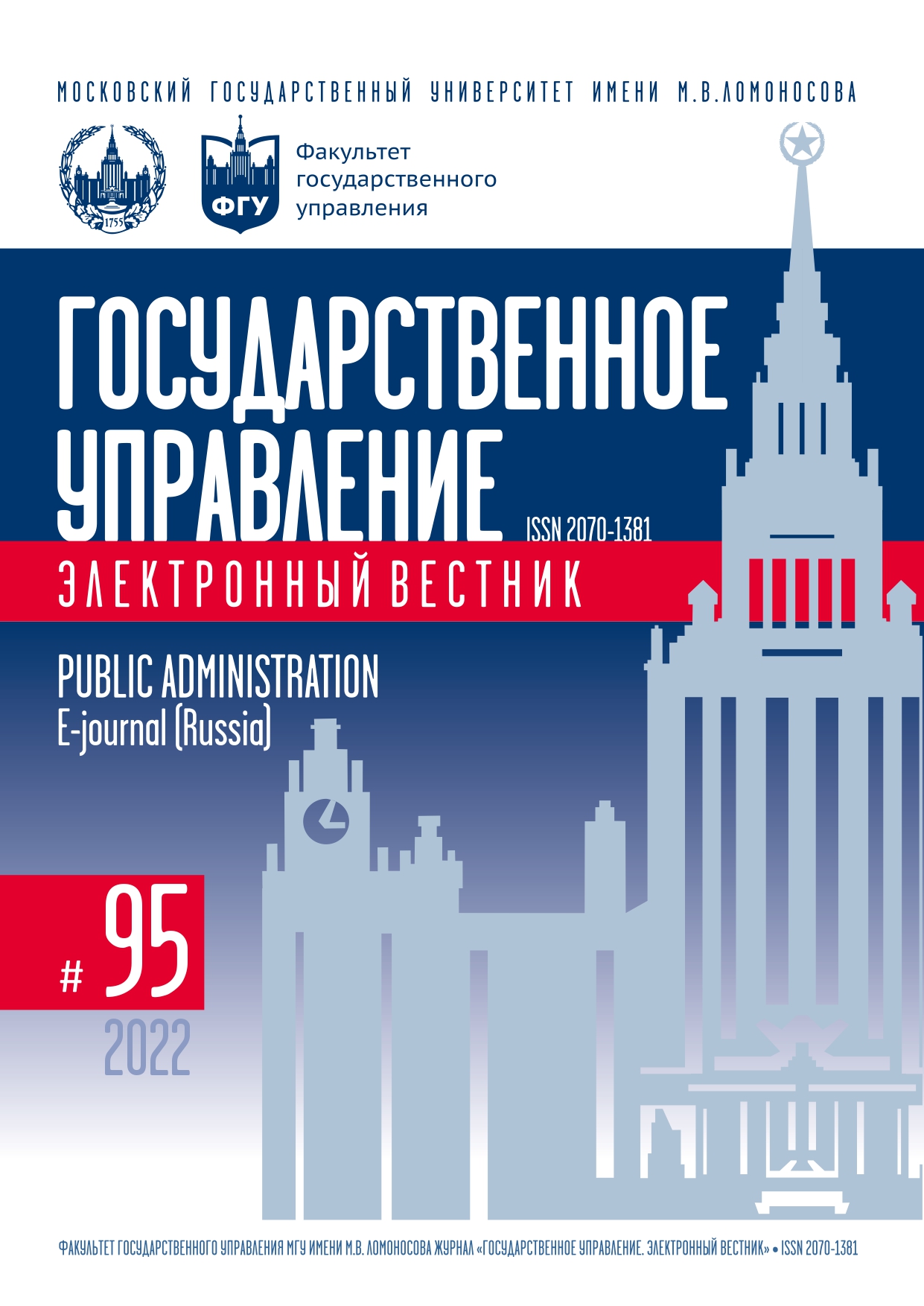International Regimes as a Factor of Interstate Bilateral Relations (the Case of Russia and Norway)
Keywords:
Russia, Norway, Barents Sea, international regimes, ocean governance, event analysisAbstract
The issues related to the impact of international regimes on the development of interstate relations remain underexplored in the international relations theory. Despite the existence of theoretical works dedicated to the form and substance of this impact, the problem of its extent remains to be researched. The case of ocean governance regime in the Barents Sea between Russia and Norway is a good example of states from confronting blocs cooperating within the framework of one international regime. The principal method of this study is event analysis which enables us to trace the dynamics of relations between Russia and Norway. Another method is quantitative content analysis which gives an opportunity to determine the significance of the regime for the development of bilateral relations. The ocean governance regime in the Barents Sea, which emerged as a result of the Treaty between the Kingdom of Norway and the Russian Federation concerning Maritime Delimitation and Cooperation in the Barents Sea and the Arctic Ocean, has had a positive impact on bilateral relations between Russia and Norway, but did not determine their development. The regime’s impact has manifested itself in three forms. Firstly, the establishment of clear rules of ocean governance has led to the emergence of cooperation in a number of areas related to the regime in question. Secondly, the quantity and intensity of crises has decreased, which has diminished the risk of an armed conflict in the region. Thirdly, the Treaty became a positive precedent, having demonstrated the states’ ability to reach agreements on complex issues. Nevertheless, the impact of the international regime on the bilateral relations’ dynamics has a secondary role compared to the structural factors of the international system. In case of Russia-Norway relations, the structural impact was mostly transmitted through the crises of 2014 and 2022 connected with Ukraine.
References
Зиланов В.К. Арктическое разграничение России и Норвегии: новые вызовы и сотрудничество // Арктика и Север. 2017. № 29. С. 28–56. DOI: 10.17238/issn2221-2698.2017.29.28
Лукин Ю.Ф. Договор между Россией и Норвегией-шаг к мирному переделу морского пространства Арктики // Арктика и север. 2011. № 2. С. 59–96.
Мелков Г.М. Юридическая оценка Договора между Россией и Норвегией // Рыбные ресурсы. 2010. № 4. С. 10–13.
Остхаген А., Йоргенсен А.-К., Му А. Рыбоохранная зона Шпицбергена: как Россия и Норвегия разрешают арктические разногласия // Арктика и Север. 2020. № 40. С. 183–205. DOI: 10.37482/issn2221-2698.2020.40.183
Повал Л.М. Российско-норвежские соглашения о разделе арктических пространств // Арктика и Север. 2012. № 6. С. 118–143.
Порцель А.К. Спор о Шпицбергене: точка не поставлена // Арктика и Север. 2011. № 3. С. 42–62.
Хейер Т. Норвегия между США и Россией. М.: Издательство «Кучково поле», 2020.
Demin S., Shvydun S. Analysis of Disputed Territories in the Barents Sea // International Conference on Group Decision and Negotiation. Cham: Springer, 2020. P. 32–44. DOI: 10.1007/978-3-030-48641-9_3
Gehring T. Methodological Issues in the Study of Broader Consequences // Regime Consequences. Methodological Challenges and Research Strategies / ed. by A. Underdal, O.R. Young. Dordrecht: Springer, 2004. P. 219–246. DOI: 10.1007/978-1-4020-2208-1_9
Henriksen T., Ulfstein G. Maritime Delimitation in the Arctic: The Barents Sea Treaty // Ocean Development & International Law. 2011. Vol. 42. Is. 1–2. P. 1–21. DOI: 10.1080/00908320.2011.542389
Hønneland G. Hvordan skal Putin ta Barentshavet tilbake? Trondheim: Akademika forlag, 2013.
Hønneland G. Norway and Russia: Bargaining Precautionary Fisheries Management in the Barents Sea // Arctic Review. 2014. Vol. 5. Is. 1. P. 75–99.
Keohane R.O. After Hegemony. Princeton: Princeton university press, 2005.
Krasner S.D. Structural Causes and Regime Consequences: Regimes as Intervening Variables // International Organization. 1982. Vol. 36. Is. 2. P. 185–205. DOI: 10.1017/S0020818300018920
Østhagen A. High North, Low Politics — Maritime Cooperation with Russia in the Arctic // Arctic Review. 2016. Vol. 7. Is. 1. P. 83–100. DOI: 10.17585/arctic.v7.255
Østhagen A. Managing Conflict at Sea: The Case of Norway and Russia in the Svalbard Zone // Arctic Review. 2018. Vol. 9. P. 100–123. DOI: https://doi.org/10.23865/arctic.v9.1084
Rittberger V., Zürn M. Towards Regulated Anarchy in East-West Relations: Causes and Consequences of East-West Regimes. Tübingen: Arbeitsgruppe Friedensforschung, 1989.
Stein A.A. Coordination and Collaboration: Regimes in an Anarchic World // International Organization. 1982. Vol. 36. Is. 2. P. 299–324. DOI: 10.1017/S0020818300018968
Stokke O.S. Examining the Consequences of Arctic Institutions // International Cooperation and Arctic Governance: Regime Effectiveness and Northern Region Building / ed. by O. Stokke, G. Hønneland London: Routledge, 2007. P. 13–26.
Underdal A., Young O.R. Regime Consequences: Methodological Challenges and Research Strategies. Dordrecht: Springer, 2004.
Vylegzhanin A.N., Young O.R., Berkman P.A. Governing the Barents Sea Region: Current Status, Emerging Issues, and Future Options // Ocean Development & International Law. 2018. Vol 49. Is. 1. P. 52–78. DOI: 10.1080/00908320.2017.1365545
Wilhelmsen J.M., Gjerde K.L. Norway and Russia in the Arctic: New Cold War Contamination? // Arctic Review. 2018. Vol. 9. P. 382–407. DOI: 10.23865/arctic.v9.1334
Wilson Rowe E., Blakkisrud H.A New Kind of Arctic Power? Russia’s Policy Discourses and Diplomatic Practices in the Circumpolar North // Geopolitics. 2014. Vol. 19. Is. 1. P. 66–85. DOI: 10.1080/14650045.2013.789863
Young O.R. Regime Dynamics: The Rise and Fall of International Regimes // International Organization. 1982. Vol. 36. Is. 2. P. 277–297.
DOI: 10.1017/S0020818300018956
Young O.R. The Politics of International Regime Formation: Managing Natural Resources and the Environment // International Organization. 1989. Vol. 43. Is. 3. P. 349–375. DOI: 10.1017/S0020818300032963
Young O.R. Political Leadership and Regime Formation: On the Development of Institutions in International Society // International Organization. 1991. Vol. 45. Is. 3. P. 281–308. DOI: 10.1017/S0020818300033117
Young O. The Consequences of International Regimes // Regime Consequences. Methodological Challenges and Research Strategies / ed. by A. Underdal, O.R. Young. Dordrecht: Springer, 2004. P. 3–23.

